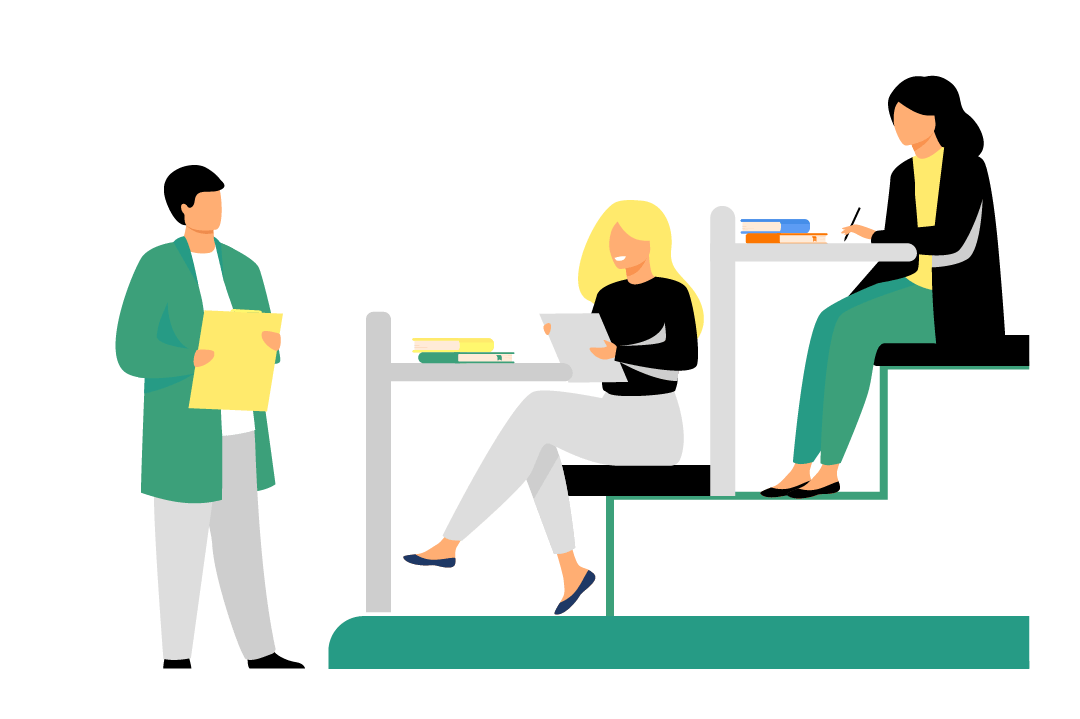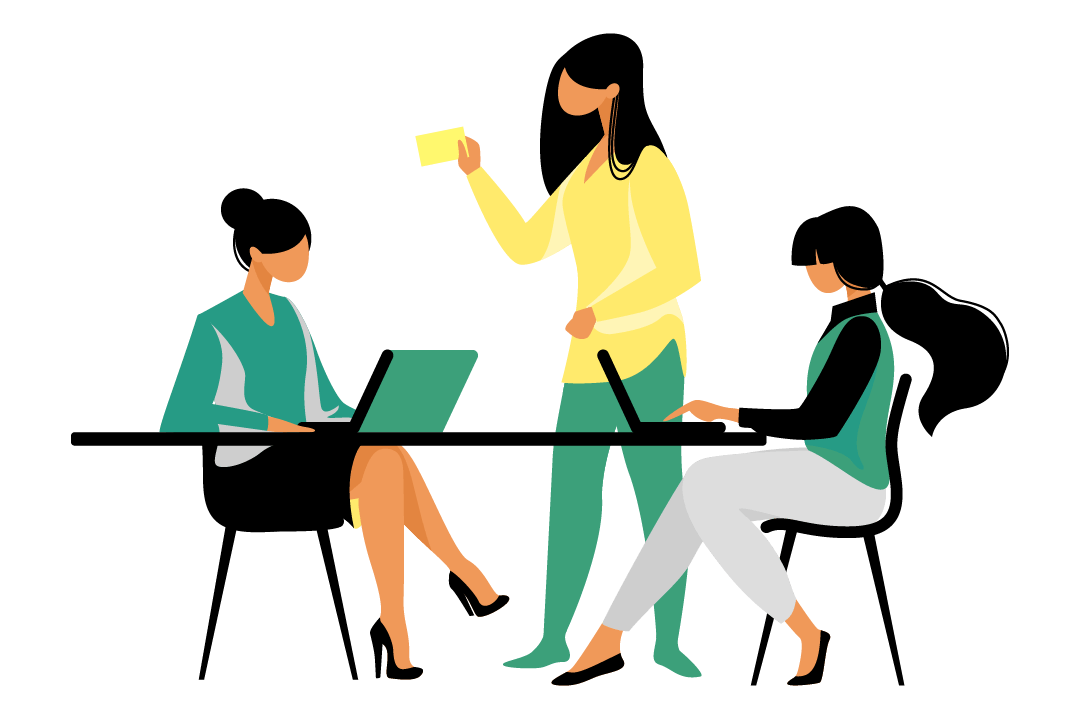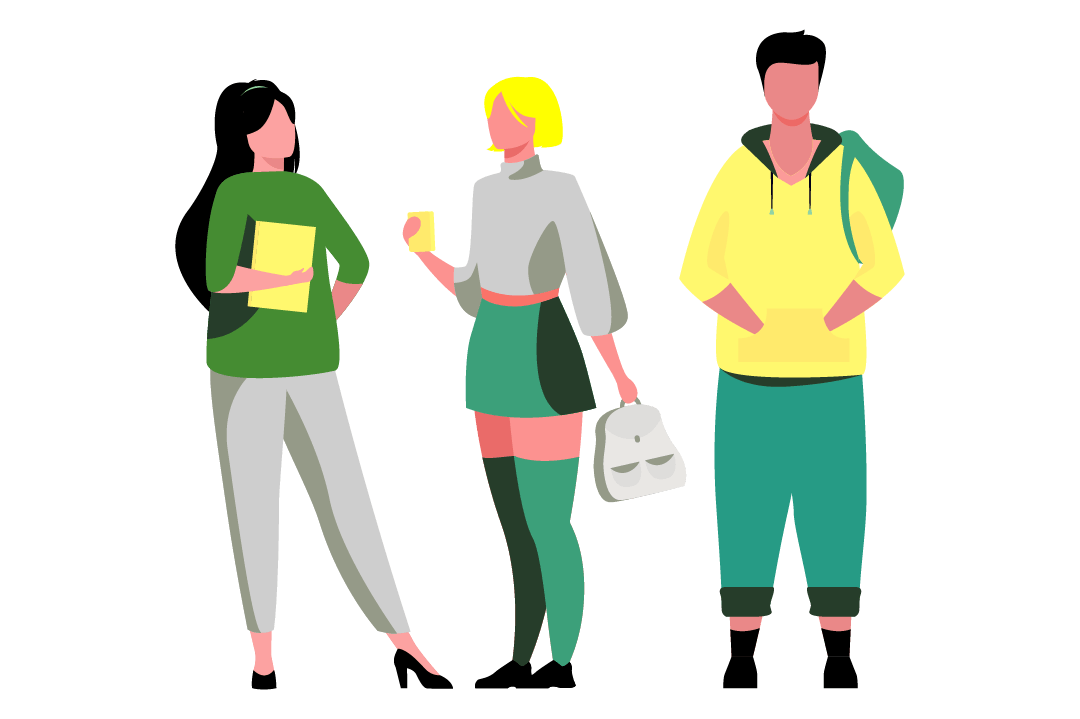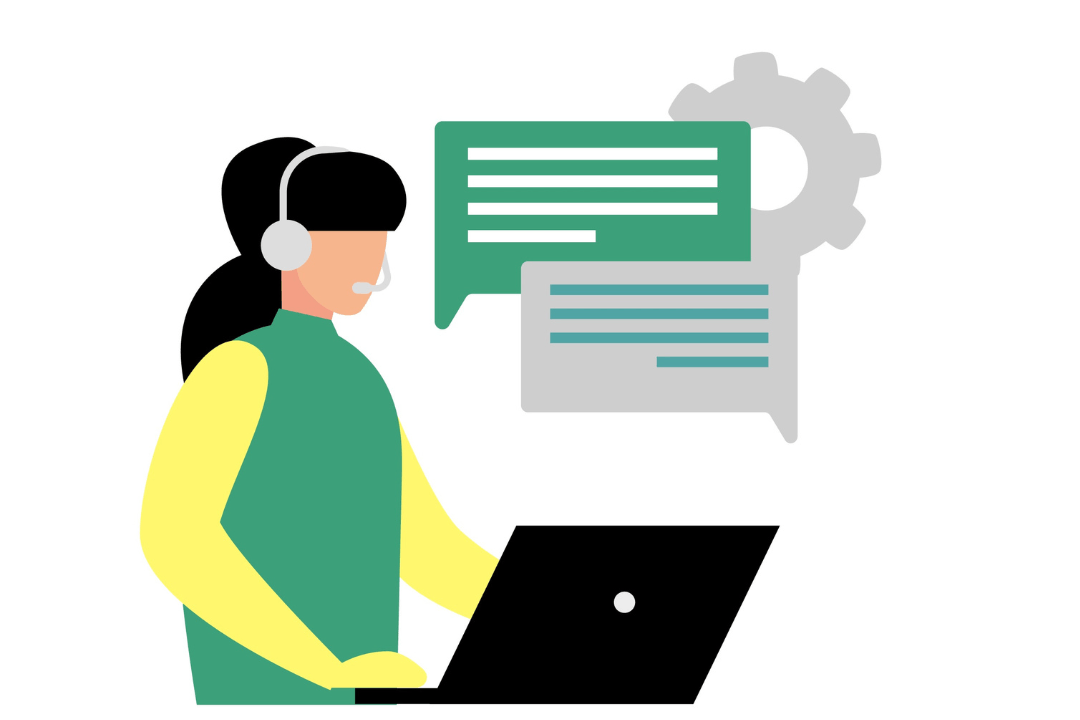APPLIED SCIENCES
Applied Sciences
European High School
Are you passionate about the world of science? Do you want to be a leader in emerging scientific jobs?
Are you looking for a modern, international scientific high school, based on the experimental method and STEM teaching?
Applied Sciences is the right path for you.
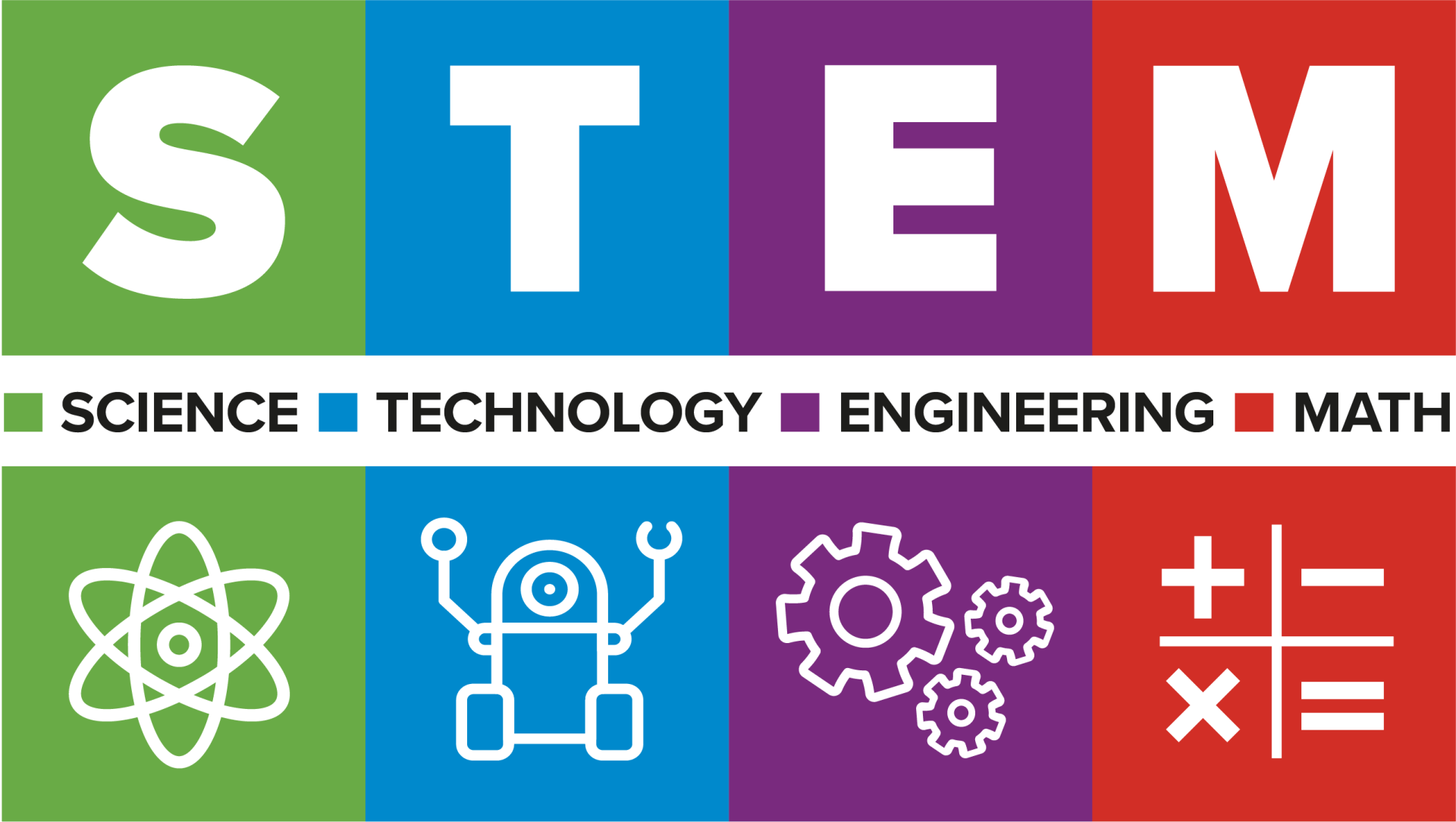
What characterizes it
It's a new advanced science curriculum, already adopted by schools around the world, that teaches you how to use science, technology, engineering, and mathematics to solve real-world problems.
Educational path
You will study mathematics, physics, chemistry, and biology in an active and experimental way.
Workshops, group activities and interdisciplinary projects will help you understand the reality around you and develop critical thinking and problem-solving skills.
You will gain excellent mastery of digital technologies.
You will learn to use tools like coding, robotics, and artificial intelligence to address new challenges for the environment, health, and society.
You will understand the major contemporary issues and develop a spirit of initiative and openness to change, to transform ideas into projects that create value for society.
English will be one of your strengths. Thanks to lessons taught in English, native teachers, and multimedia labs, you'll be able to communicate effectively with the world of science, obtain advanced language certifications, and, if desired, even a double UK diploma.
Study plan
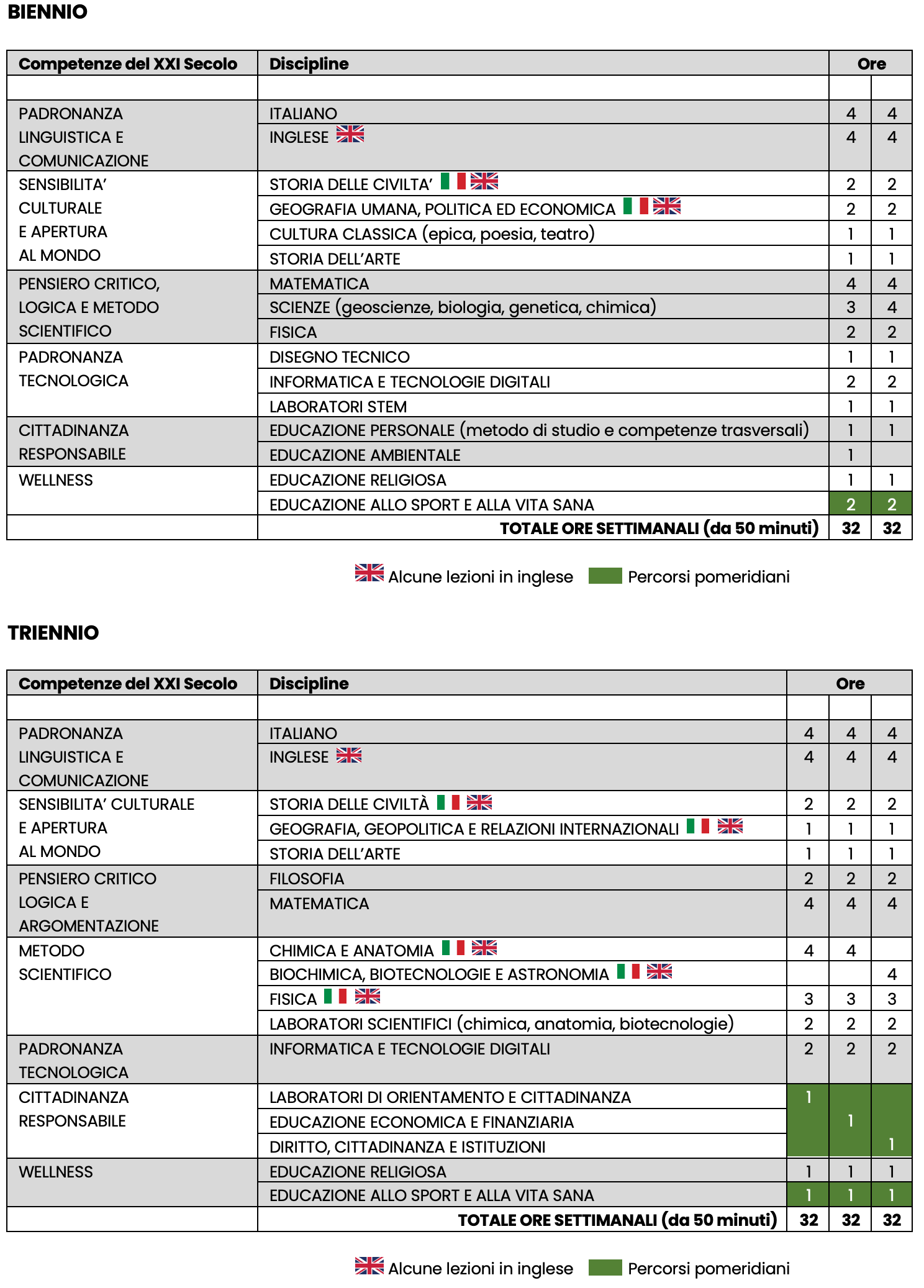
Enhancements
Classical Culture: this is one of the core courses of the two-year program, focusing not on Latin, but on epics, poetry and drama from the classical world. An extraordinary journey into Greek and Latin culture, the foundations of Western civilization.
Italian: the development of epics and poetry in the classical culture course allows the Italian course to strengthen linguistic skills and introduce you to reading and writing.
English: 4 hours per week, native-speaking teachers, language labs, lessons in English for non-language subjects.
Geography: also with a human, political, and economic perspective, attentive to world cultures and international relations.
Art History: lessons from the first year onwards, taught in parallel with the history curriculum.
Science and technology laboratories: a dedicated space for applying the scientific method to real-life problems.
Additional subjects
Environmental education: a highly topical course on sustainable human development, urbanization and pollution, renewable energy, waste, recycling, and human impact on the environment.
Digital education: fundamentals of computer science, coding, robotics, the internet, artificial intelligence, and Office. You'll learn how to create a video, a multimedia presentation, and a website.
Personal education: study methods, teamwork, communication, self-confidence, and results-oriented approaches.
Civic education: law, citizenship and institutions, forms of state and government, international organizations.
Economic and financial education: basics of personal economics and finance, budgeting, saving and investing, opening a bank account, applying for a loan, understanding paychecks, starting a business.
Wellness: nutrition and healthy living education, sex education, and sports education, including non-traditional ones: yoga, pilates, dance, meditation, and aerobics.
The IESS Experience
Experiences abroad: four-week study abroad program at an English school. Summer school and work experience.
International projects: Erasmus projects and exchanges with schools in other countries.
Educational trips: field trips, museum visits, shows, and cultural events.
Career orientation: meetings with scientists, researchers, and managers on STEM professions.
Field experience: internships and workshops at universities, research centers, and innovative companies.
The IESS method
Only three lessons a day: focus your attention on fewer subjects and have more space to work with the teachers.
Active participation in lessons: lessons are more stimulating, you follow more attentively and you learn more easily, even at home.
Laboratory lessons: in class, put theory into practice in labs and group work. Understanding is more important than memorization.
Dialogue with teachers: engage in ongoing dialogue with teachers, in a climate of trust and collaboration.
Constant use of new technologies: personal iPads, digital textbooks, Wi-Fi and Internet, even in the classroom.
Attention to each student: a tutor closely follows you in your personal and academic growth.
Your growth matters more than grades: you no longer focus solely on grades but on improving every day. In the end, even your grades are better.
After high school
University
You will be able to continue your studies in all university faculties, particularly Medicine, Mathematics and Physics, Biology and Biotechnology, Engineering, Natural Sciences, Computer Science, Chemistry and Pharmacy, but also Economics and Architecture.
Careers
You can launch your own innovative startup or enter numerous emerging work environments, in Italy and abroad.
As a professional, in professional firms in engineering, architecture, biology, and medicine; in universities, research centers, research institutions, and international organizations in the scientific field; and in healthcare, in the medical field.
As a manager, in companies, institutions, and consulting firms, in the fields of research and development, engineering, information technology and telecommunications, management, energy, the environment, and land use.
Want to know more?
What makes it unique
You'll learn the scientific method through hands-on laboratory experience, reflecting on the mistakes and results of your work. You'll develop the right mix of theoretical knowledge and practical experience, as well as critical thinking and problem-solving skills, which will enable you to take on the challenges of university and the professional world as a leader.
Small size classes
20 students selected on academic achievement.
Solid scientific background
Earth Sciences, Biology, Chemistry, Anatomy, Biotechnology, Astronomy.
Digital skills
Coding, artificial intelligence, robotics, cybersecurity, data science.
Cutting-edge scientific laboratories
Computer Science, Physics, Chemistry, Virtual Reality, Biology and Biotechnology.
English empowerment
Lessons also in English, Cambridge certifications and double UK diploma.
Interdisciplinary projects and workshops
STEM projects on global challenges: energy, climate, health, society.
Field experience
Internships and workshops at universities, research centers, and innovative companies.
International experiences
Study trips to an English school. Summer school and work experience.
Erasmus projects and exchanges with schools in other countries.
